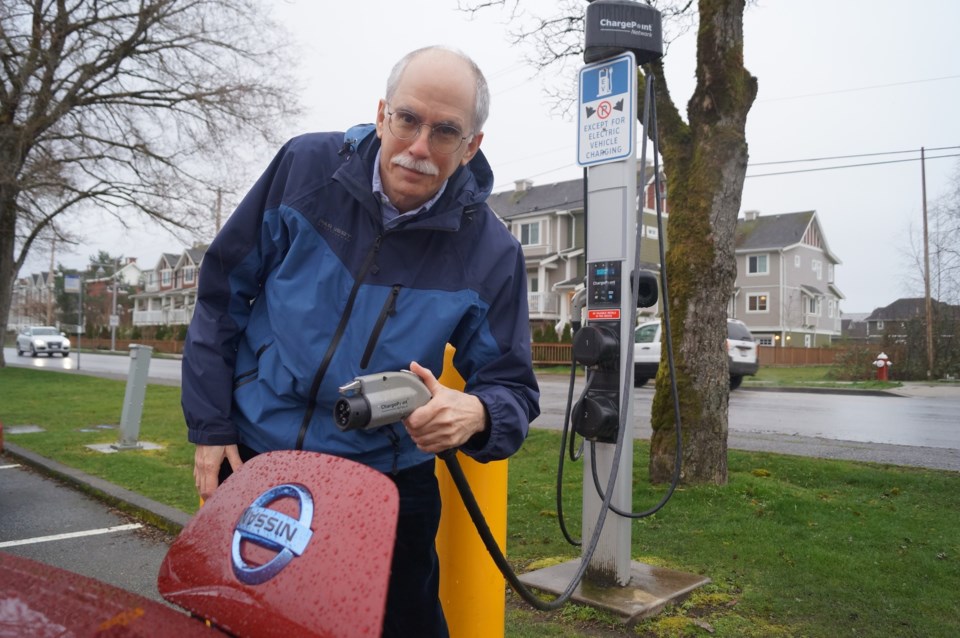As electric vehicle ownership is expected to surge in the coming decades, city planners are taking a second look at their policies surrounding charging infrastructure.
Richmond’s sustainability manager, Brendan McEwen, is embarking on a consultation process with the public, businesses and developers to explore expanding electric vehicle (EV) charge stations.
There are two main components to the proposed expansion: the introduction of publicly available, fast-charging stations, which currently don’t exist in Richmond; and increasing the number of charging stations in residences, in order to meet future demand for EVs.
EV owner John Roston, founder of Plug-in Richmond, an EV advocacy group, contends the City of Richmond should subsidize the installation of home charging stations, which can prove to be a significant barrier for EV ownership.
Presently, an EV can be charged through regular electrical outlets (known as Level 1 charging within the EV industry), but the process takes about eight hours. However, if a homeowner buys a $500 charger to increase voltage to a Level 2 charge, an EV can be powered in 2-4 hours.
“Facilitating overnight, Level 2 charging at home is going to be far more important than providing public charging stations around Richmond both for Richmond residents and visitors to Richmond,” contends Roston, who likens the subsidies to those the city offers for energy-efficient appliances.
Whereas one public charging station may cost $10,000, 20 subsidies could be provided, Roston estimates. He wants the City of Richmond to match Vancouver’s recent $3 million commitment to EV infrastructure over the next five years, on a per capita basis, with $1 million in subsidies and improvements.
McEwen notes, in a report to council this week, there are more significant barriers to charging infrastructure in older townhouses and apartments.
For instance, McEwen cites an estimate from the Condominium Homeowners Association that it would cost about $10,500 to retrofit an EV charger in a multi-family parking area. That’s why he is suggesting increasing the number of charge-capable parking spaces in new developments.
Presently, Richmond requires new apartment complexes to have 45 per cent of all parking spaces with Level 1 charging capacity (20 per cent wired and 25 per cent capable of being wired). This leaves 55 per cent of spaces without any potential for electrical charging.
This may prove problematic as EV sales could constitute 50 per cent of passenger vehicle sales by 2040, according to some estimates.
“Under the current policy, 55 per cent of parking space owners will face a significant cost to implement any form of home charging,” noted McEwen.
It’s suggested that more parking spaces be pre-wired for charging capabilities and that Level 2 charging become the standard. McEwen said the city will explore incentives for developers to do so.
Meanwhile, Roston said Level 3 charging stations are a must to spark EV ownership. The city reports it is exploring these “fast-charge” stations — perhaps with the support of local businesses — to be installed on major roads and highways.
Richmond has no fast-charging stations. It does have four, public Level 2 charging stations it provides free of charge. From 2013 to 2015, usage has increased about eight-fold. Last year, from January to September, EV users took advantage of $3,880 worth of electricity, saving 16.3 tonnes of carbon emissions (18,344-litres of gas).
Across the city, there are 27 private charging stations for public use (ie. IKEA, YVR, Aberdeen Centre).
Roston thinks EV use will become ubiquitous as battery technology advances and gas prices rise. He said cars may soon be charged with solar-powered roofs and EVs can act as emergency back-up power source for homes during blackouts.



